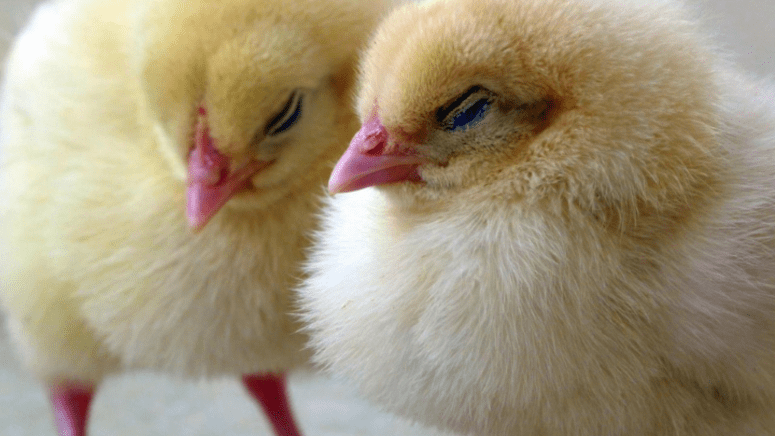Reviewed by a Licensed Veterinary Technician, January 17, 2024
Raising baby chicks requires careful consideration of their nutritional needs. The right chick feed is crucial for their growth, health, and overall well-being. And for your precious flock, not just any chicken feed will do. Chick starter feed specifically designed for baby chickens is what you should look for.
But how do you know what to look for and how to choose the right chick feed? In this guide, we'll explore important topics such as medicated vs. non-medicated crumbles, how to choose chick feed, the duration of feeding chick starter, the difference between chick feed and chicken feed, and what to feed a baby chick.
What is Chick Feed? Chick Feed Terminology
Before we begin, let's review some key terms you'll need to help you pick out the right chick feed for your babies:
- Medicated: chick feed that contains medication for common chicken diseases
- Non-medicated: chick feed that does not contain any medication
- Crumbles: the preferred size for chick feed
- Starter Grower: chick feed for age range hatch to 16 weeks of age
-
Layer: adult chicken that is old enough to lay eggs
Medicated vs. Non-Medicated Chick Feed
Understanding Medicated Chick Starter
Medicated chick starter is a type of feed that contains medication, typically amprolium, to prevent coccidiosis, a common intestinal parasite in young chicks. Coccidiosis can be harmful and even fatal, especially in crowded conditions. Medicated feeds help control this risk during the critical early weeks of a chick's life.
Non-Medicated Chick Starter
Non-medicated chick starter, on the other hand, doesn't contain any medication. If you are raising chicks in a clean and controlled environment, non-medicated feed might be a suitable choice. Check out our Top 6 Chicken Diseases blog for ways to help prevent the most common diseases facing your flock.

How to Choose Chick Feed
Choosing the right chick feed involves considering various factors, including the breed of chicks, their age, and your specific goals. Here are some key points to keep in mind:
- Protein Content: Opt for feed with the appropriate protein content. Young chicks generally require higher protein levels for proper development. Manna Pro’s chick feeds feature 18% protein, for example.
- Read Labels: Carefully read the labels on chick feed bags. Look for essential nutrients like amino acids, vitamins, minerals or high-quality ingredients.
- Brand Reputation: Choose reputable brands known for producing high-quality chick feed. Consult with experienced poultry keepers or veterinarians for recommendations.

How Long Do I Feed Chick Starter?
Chick starter is the primary feed for baby chicks, and the duration of feeding depends on the breed and growth rate. As a general guideline, Chick Starter Grower Medicated and Non-Medicated are indicated for hatch through 16 weeks of age.
Regularly assess the growth and condition of your chicks to determine when to switch to a different type of feed.
When to Switch Chicks to Regular Feed?
When do you switch chicks from start grower to regular feed? The magic time frame usually happens when your chicks are about 16 to 20 weeks old. This is when they're not so little anymore and are ready for the big leagues of chicken food, also known as grower or layer feed.
Why wait until 16 to 20 weeks? Well, it's all about making sure your chicks have enough time to grow strong on the starter feed, which is specially designed for their young age. Rushing them into grower feed too soon can be like asking a kindergartener to lift weights - not exactly a good fit, right?
Now, when the time comes to make the switch, it's not just about flipping a switch overnight. You'll want to gradually introduce the grower feed over a week. Mix a little of the new stuff with the old, slowly increasing the amount of grower feed each day. This way, your chicks don't get an upset tummy from a sudden change in their diet.
How Much Does a Chick Eat Per Day?
Wondering how much your little peepers need to eat every day? On average, a chick gobbles up about 1 -2 ounces of feed per day; that equates to about 1 pound of food per chick every week.
Some might nibble a little more, and some a little less, depending on their size and how fast they're growing. It's like how some of us might snack a bit more than others. Just make sure there's always enough feed in their trough so every chick gets its fill and grows up healthy and strong!
What is Chick Starter Feed Made Of?
Chick starter is a careful blend of grain, protein and nutrients specially designed for baby chicks. Grains such as corn and wheat give your chicks the energy they need to play and grow. Proteins help build strong muscles as your babies grow up. When picking a starter feed, look for one that has at a minimum 18% protein.
Manna Pro Chick Starter Feed contains calcium for strong bones, amino acids to support development plus zinc, iron, manganese and other vitamins and minerals for optimal baby chick health. Our Medicated Chick Starter features Amprolium to help prevent coccidiosis.
Difference Between Chick Feed and Chicken Feed
The terms "chick feed" and "chicken feed" are often used interchangeably, but there are notable differences:
- Nutritional Composition: Chick feed has higher protein content to support rapid growth, while chicken feed is formulated for maintenance and egg production.
- Calcium Levels: Layer feed contains higher calcium levels for shell development in laying hens, which is unnecessary for growing chicks.
- Transition Period: As chicks grow, they transition from chick starter to grower feed and eventually to layer feed, tailored to their specific nutritional needs.

What to Feed Baby Chicks
In addition to nutritionally complete and balanced chick starter grower, here are some more essentials for your girls:
- Fresh Water: Ensure a constant supply of clean, fresh water, changed regularly.
- Grit: Once chicks start consuming solid food, provide chick-sized grit to aid digestion. Note that grit is only necessary for chicks that consume non-crumble feed such as treats or scratch grains. Grit is not necessary for chicks only eating crumbles.
- Treats in Moderation: Introduce small amounts of appropriately sized fruits, vegetables, and mealworms as treats. However, these should not replace the main chick feed.
- Green Forage: Chopped green forage, such as grass or clover, can be offered as a supplemental source of nutrients.

How to Feed Baby Chickens: Chick Feeders
Using chick feeders is a practical and essential aspect of raising baby chickens. These specialized feeders offer several advantages over the alternative of simply scattering feed on the ground.
Chick feeders help maintain a clean and hygienic environment by reducing contamination and waste. They allow for better portion control, ensuring that chicks receive an appropriate amount of feed for their nutritional needs.
Additionally, using feeders promotes healthier eating habits among the chicks, as they can access the feed easily without foraging through debris. This method of feeding also minimizes the risk of diseases associated with ground contact and provides a more efficient way to monitor the chicks' consumption.
Chick feeders contribute to the overall well-being of the chicks by offering a controlled, clean, and efficient feeding solution.

Where to Buy Chick Feed?
Wondering where you can purchase this all important product for your flock? Local farm and feed stores, co-ops and the big guys like Tractor Supply, Stateline Tack and Walmart are great resources to buy chick feed. Check out our Where to Buy tool to find chick feed near you today!
Manna Pro: Your Chick Feed Resource
In conclusion, providing the right chick feed is vital for the healthy development of baby chickens. Consider their specific needs, monitor their growth, and make informed choices to ensure a successful and rewarding poultry-raising experience.
Still not sure which chick feed is right for your flock? Reach out to one of our homestead specialists today. We look forward to speaking with you!
Feature Products

